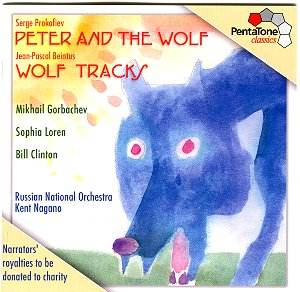People
and nature should live in harmony, musical and otherwise, is the
message, or ‘enjoy the animals but leave them be’. Given its intention
of promoting the wildlife preservationist message of conserving
the wolf, this project is fortunate to have had Prokofiev’s work
as a role model. Judging by Mikhail Gorbachev’s promise (or was
that a threat?) that he is sure we will meet him and his co-narrators
Sophia Loren and Bill Clinton again before too long, there will
probably be a CD of Taverner’s The Whale coupled with a
contemporary composer’s work (preferably Icelandic or Japanese).
The
narrators never met the orchestra, Loren and Clinton contributing
their bit four months later in Switzerland, Gorbachev six months
later in Moscow. Gorbachev speaks in Russian and is faded out
after each sentence for his words to be translated by his interpreter,
chief executive of the Russian National Orchestra, Sergei Markov.
Loren narrates Peter and the Wolf with a thick Italian
accent, strange inflections and wrong emphasis, all delivered
with a flat voice - a bit of coaching might have helped. Clinton
sounds as if he is before a TV camera, and about to deliver one
of those State of the Union speeches starting with the words ‘My
fellow Americans’, in short, there’s a lot of sanctimonious claptrap
both on the CD and in the booklet.
A
double bass player in Nagano’s Lyon Opera Orchestra, Beintus’s
music is a film-music score, its attractive style lapsing into
fellow-Lyonnais Maurice Jarré at its best, sentimental
Richard Clayderman at its worst. Nagano’s orchestra play slickly,
with a smooth-as-silk sheen to the string sound. At least Prokofiev’s
music, unlike his wolf, survives unscathed. Strictly for the kids
(and no harm in that, as it is the future generation for whom
this message is intended), but perhaps also for werewolves. Approach
with caution.
Christopher
Fifield
